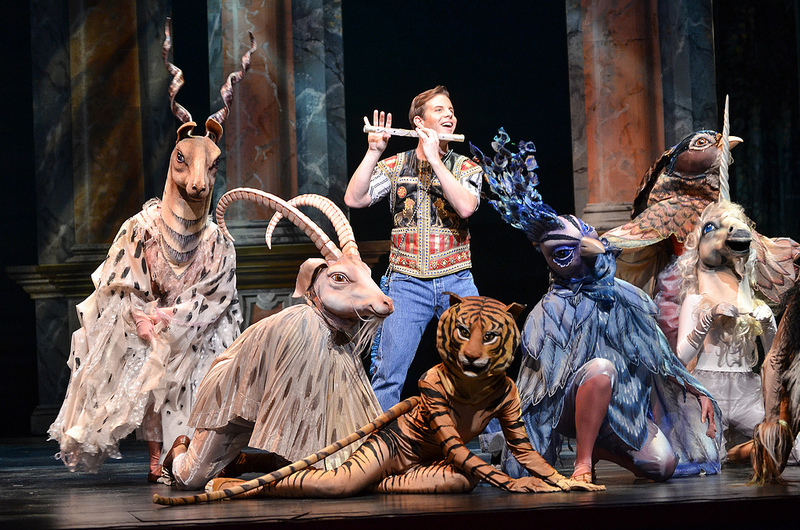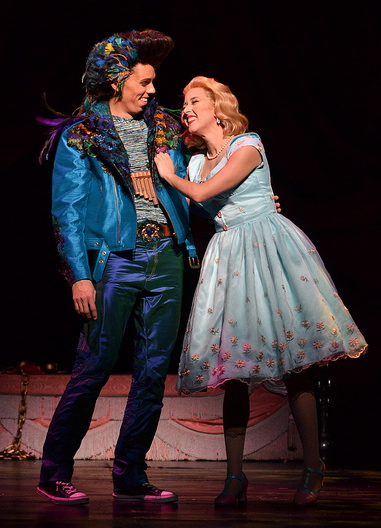FGO serves up an entertaining and spectacular “Magic Flute”

Andrew Bidlack as Tamino with friends in Florida Grand Opera’s production of Mozart’s “The Magic Flute.” Photo: Gaston de Cardenas
Florida Grand Opera’s imaginative, hugely entertaining production of Mozart’s The Magic Flute begins unpromisingly with one of the oldest tricks of revisionist stage directors: Framing the opera as a dream.
As the overture starts, the curtain at the Arsht Center in Miami rises and we see a modern bedroom. The tenor Andrew Bidlack, looking far too old to be anyone’s child, sits there as his father enters, reaches into a case marked with the Masonic square and compass and brings out a book entitled “The Magic Flute.” After reading himself to sleep, the boy experiences a nightmare about being pursued by a dragon and sings the opera’s opening words, “Zu Hilfe! Zu Hilfe!” (Help! Help!). From there unfolds the story of a queen of malevolent motives (if elaborate coloratura), a wise king and the boy’s adventure of rescue, ritual initiation, romance and personal discovery.
The dream device, thankfully, occurs only as an intermittent theme, rather than dominating the opera, a visually spectacular production that fully enters into the magical world of Mozart (whose 257th birthday is today).
Stage director Jeffrey Marc Buchman used the flashback sequences, which also appeared to take place around the mid-20th century, judging from the clothing and furniture, as a device to bookend the opera without dominating it. His direction allowed the jokes and plot to unfold briskly, usually without getting in the way of the music.
Still, not all the framing material worked. In the opening of Act 2, for example, as the orchestra plays a solemn, soft-toned melody to accompany the entrance of priests into a forest temple, this version shifted the attention jarringly to the boy’s father checking on him in his bedroom.
Costumes and scenery were something of a grab bag, with Papageno wearing a pompadour and sneakers, as well as the traditional feathers, and Pamina costumed in a dress that appeared to come from a 1950s sitcom.
Bidlack manages to look and sound valiant as Tamino while singing Dies Bildnis in striped pajamas, with a smooth legato and heroic top notes. His manner and tone perfectly matched the youthful, but determined prince who is willing to meet any danger to rescue the Queen’s beautiful daughter, Pamina.

Jonathan G. Michie as Papageno and Lisette Oropesa as Pamina in “The Magic Flute.” Photo: Gaston de Cardenas
As Tamino’s sidekick, the not-all-that-brave, not-all-that-bright bird catcher Papageno, Jonathan G. Michie inspired genuine laughter from the audience (as opposed to the uneasy, self-conscious chuckles that usually attend unfunny attempts at humor in Mozart or Rossini). He attempts to high-five an unimpressed Sarastro, addresses what he thinks is an elderly woman as “Mrs. Robinson” and a “cougar,” and steps to the edge of the pit to look up and read the translations of the German libretto above the stage (so he can understand that the gagged Pamina is saying “Could you untie me, please?”).
The broad comedy can go too far—and does when Michie’s repeated attempts to escape off the stage distracted from the beautifully sung Act 2 duet between Tamino and Pamina. But there was nothing oafish about Michie’s voice, and Der Vogelfänger bin ich ja—sung as he tries to net a giant bird—came off with rustic humor and vocal refinement, with Michie’s rich, sustained baritone and easy phrasing giving a convincing portrait of the amiable bird catcher.
The soprano Lisette Oropesa made a fresh-faced and innocent Pamina. Her aria Ach, ich fühl’s, sung as she believes Tamino no longer loves her, was genuinely moving, with quietly intense high notes and assured, unforced articulation of quick passages.
As the Queen of the Night, Jeanette Vecchione made a spectacular entrance perched on a crescent moon high above the stage, with a glittering headdress. Her first aria, O zittre nicht, in which she tells Tamino of her daughter’s plight, was a disappointment, with out-of-tune notes and imprecise coloratura. But in the famous showstopper Der Hölle Rache, she nailed the high Fs—along with what appeared to be some interpolated high notes of her own— and the soprano sang with a fury that added genuine fire to the aria.
Jordan Bisch made a formidable Sarastro, the good king who is initially believed by Tamino to be the soul of evil. His low notes came off as warmly humane lyricism, rather than indistinct rumbles, in the aria O Isis und Osiris. Although he appeared to have difficulty with the higher register passages at the beginning of In diesen heil’gen Hallen, they came off better the second time around.
Orchestra and chorus gave glowing performances of Mozart’s music. Under conductor Andrew Bisantz, the orchestra provided sensitive, unobtrusive support to the singers and grandiose tones at the big moments, such as the initial entrance of Sarastro.
A highlight throughout the opera were the appearances by the Three Ladies who work for the Queen of the Night, who pop up throughout the work to spread fear and discouragement. Scarily but stylishly costumed in dark gowns, with black eye makeup and wigs, Lacy Sauter, Cynthia Cook and Carla Jablonski sang with plush tones and a nice, malevolent edge to their voices.
The three spirits, roles taken by boys whose voices haven’t yet changed, were winningly portrayed by Andres Larrea, Charles Vega and Salvador Blanco. If everything wasn’t note-perfect, they sang with a vocal purity and displayed a lively stage presence.
As Monostatos, Matthew Maness gave a malevolent, if vocally underpowered, performance. As the Speaker, Adam Lau was dignified in both manner and voice. Hye Jung Lee proved a vivacious, vocally agile Papagena, and her final scene with Papageno was delightful, as the stage filled with children representing little Papagenos and Papagenas. Matthew Newlin and Graham Fandrei were solemn, vocally lustrous presences as the two priests.
Florida Grand Opera’s production of Mozart’s The Magic Flute runs through Feb 16 at the Arsht Center for the Performing Arts in Miami and Feb. 21 and 23 at the Broward Center for the Performing Arts in Fort Lauderdale. fgo.org; 800-741-1010
Posted in Performances
3 Responses to “FGO serves up an entertaining and spectacular “Magic Flute””
Leave a Comment
Sun Jan 27, 2013
at 1:21 pm
3 Comments






Posted Jan 28, 2013 at 12:28 pm by Paula Hepfer
Congratulations to TWO CVSM alumni, Andrew Bidlack and Carla Jablonski! We are very proud of you!
Posted Feb 02, 2013 at 9:48 pm by Alison and David Piinsley
Congratulations to Jonathan Michie!!
Posted Feb 07, 2013 at 11:22 am by Sandra Blanco
Congratulations to the whole cast!!